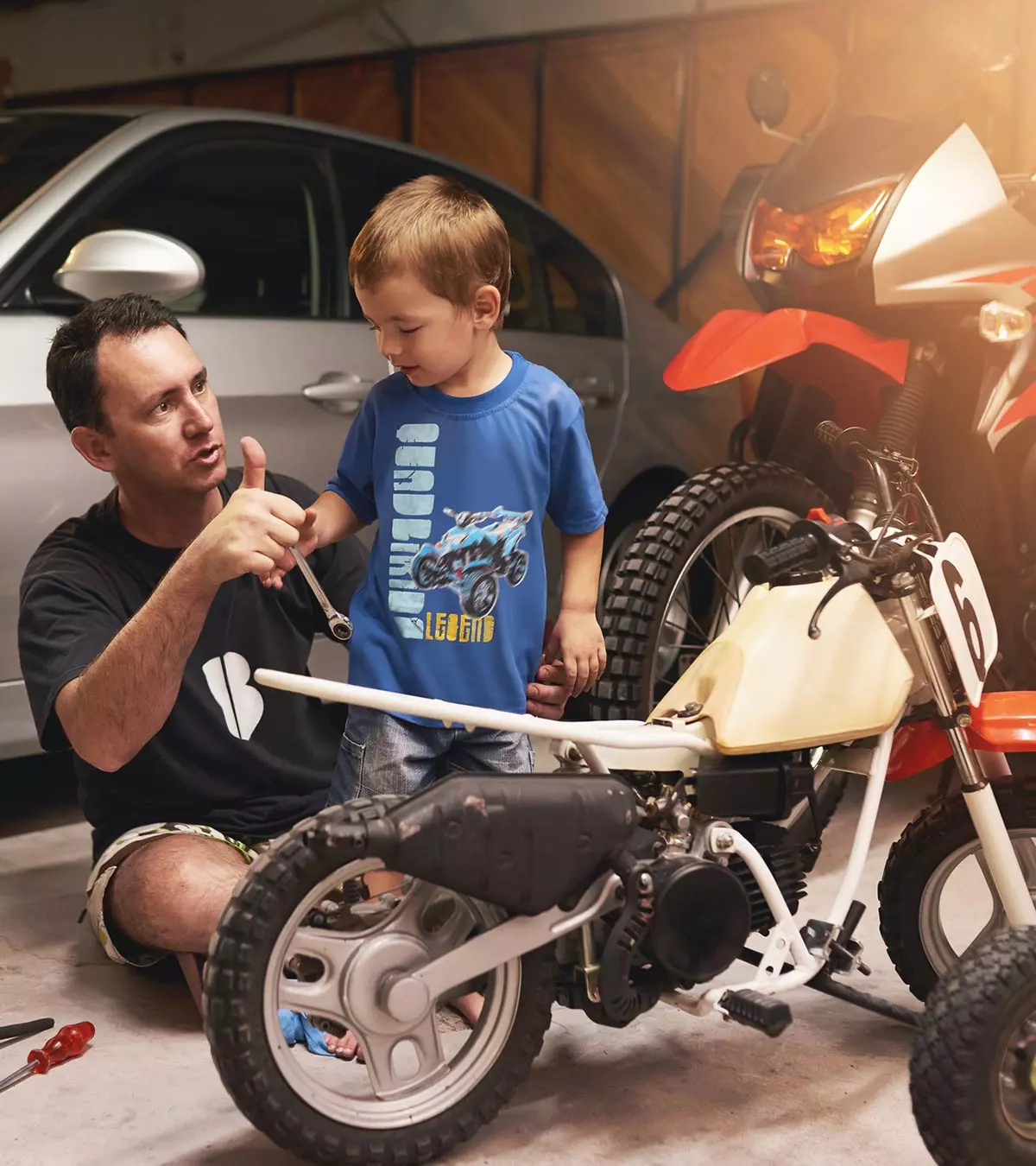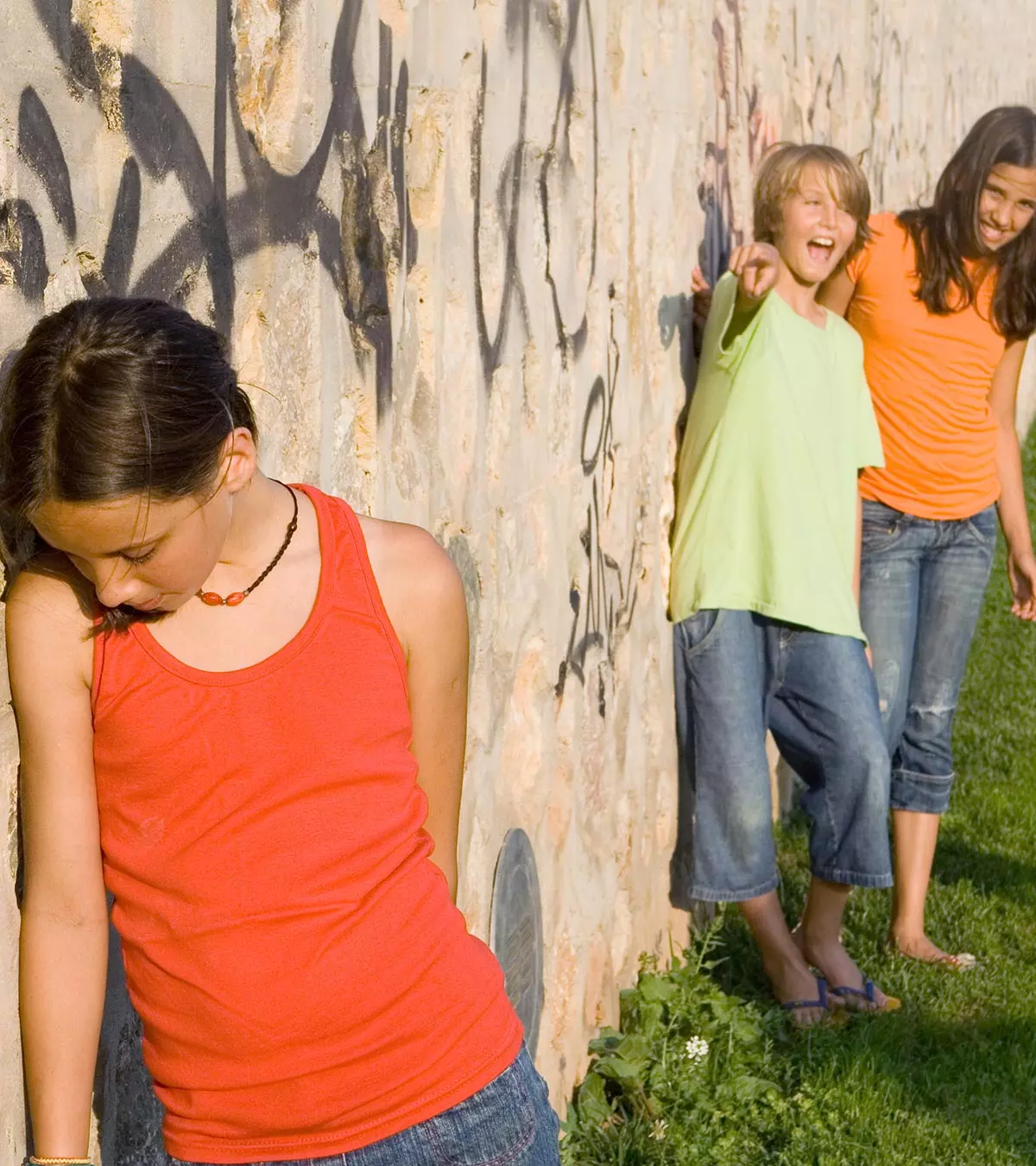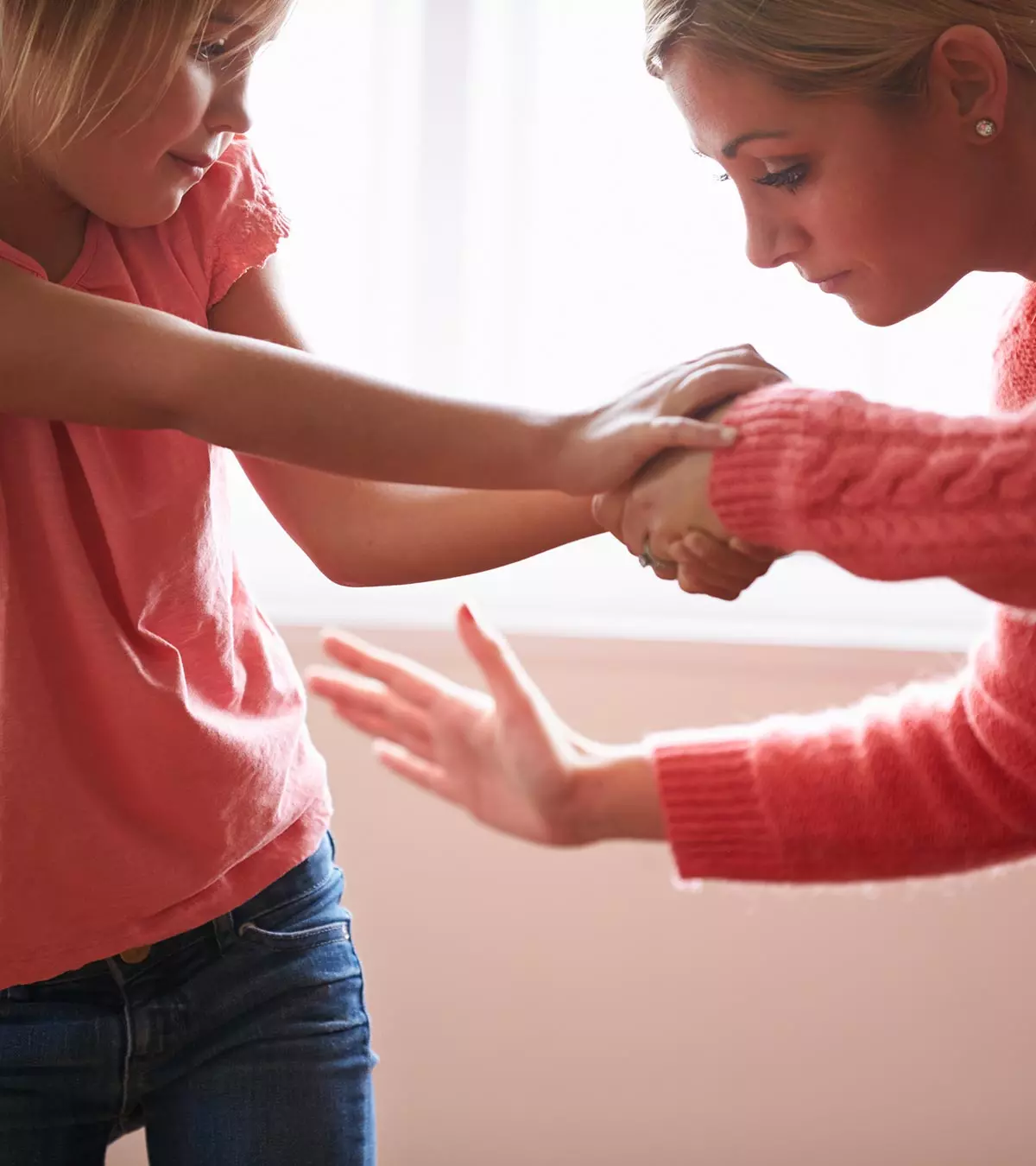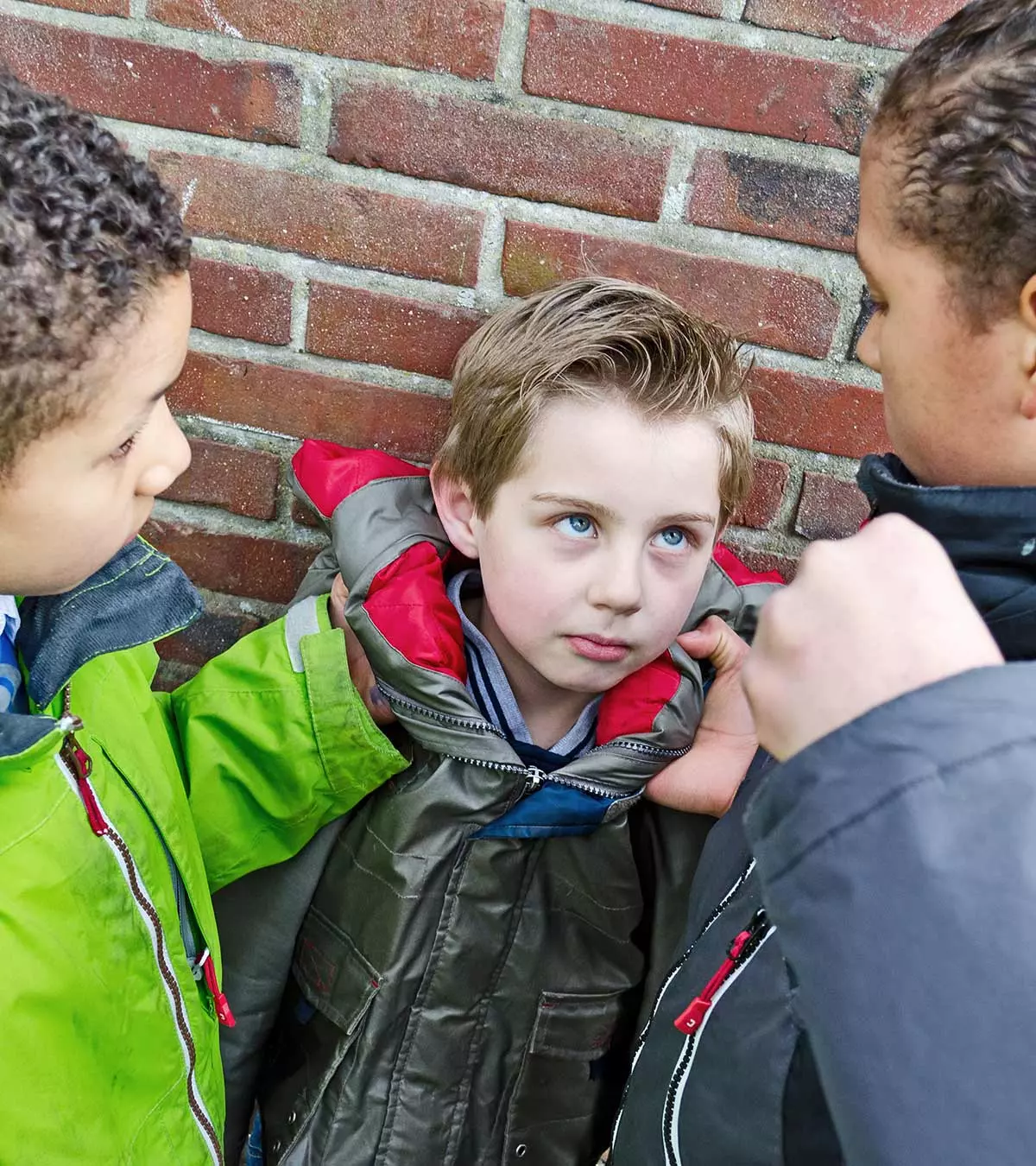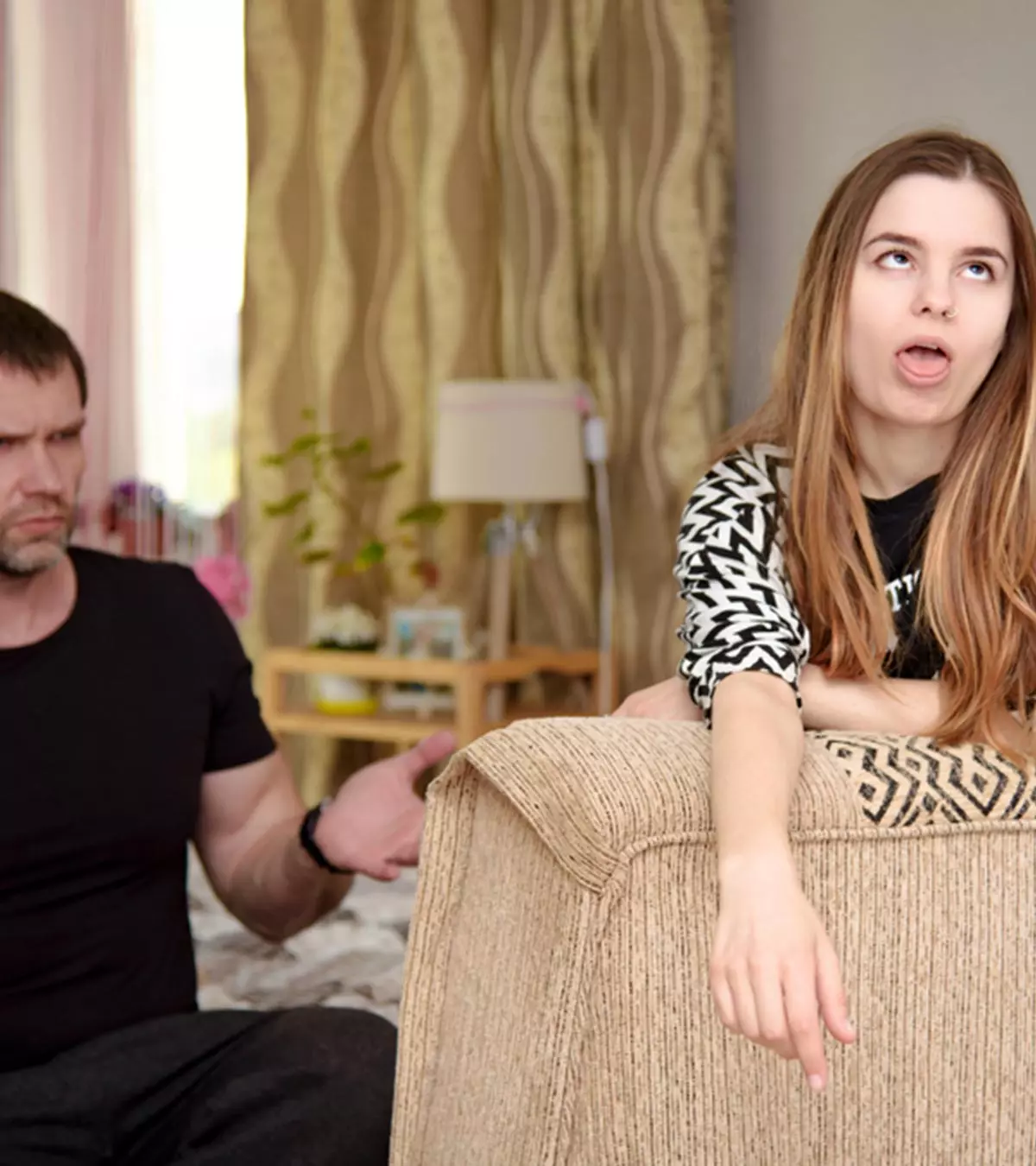
Image: iStock
Knowing how to stop kids from hitting, biting, or kicking their peers and others helps the parents control this unwanted behavior early. Unfortunately, hitting others is a common unpleasant behavior found in various stages of childhood, and many children may continue it even though parents discipline them. However, pediatric psychologists advise parents to keep calm and understand it as a poor way for young children to communicate their feelings. You may seek medical care to look for any underlying reasons if they do this in later childhood.

Read this post to know how to stop a kid from hitting, biting, or kicking peers and parents.
Key Pointers
- Young children may hit you or others to express powerful emotions such as anger, grief, or disappointment.
- Exposure to domestic violence or any form of abuse may sometimes lead to aggressive behavior in children.
- Establish home rules and teach your children that hitting someone is not a nice thing to do.
- You must understand that hitting or scolding your child will not help.
- Distracting your child’s attention with other activities may discourage them from hitting someone.
Why Do Children Hit?
Children might show acts of physical aggression to communicate their feelings. This could also be a part of their general development. Some reasons why children might hit include the following:
1. Inability to communicate
Physical aggression, such as biting, punching, throwing tantrums, etc., could express their anger and sadness, or it might indicate that they are unable to communicate their concerns. This behavior may also indicate an inability to process feelings. For example, when your child has lost a game, or things do not go as planned, they may turn aggressive (1).
2. Lack of self-control
In younger children, hitting someone may be due to a lack of self-control and an inability to understand the concept of delayed gratification. Children seek instant need fulfillment and cannot wait for their turn. Such impulsivity and impatience along with the lack of understanding that hitting someone is wrong, or a desire to test limits may cause them to indulge in aggressive behaviors such as hitting (2).
3. Need to feel powerful
A child may also hit their siblings or others to show their power and domination over others. This feeling of power may have been reinforced unintentionally by one or more events where they achieved something they wanted (such as receiving a toy) through force (3).
4. Childhood trauma
Several studies have established a link between childhood trauma with depression, anxiety, post-traumatic stress, and problem behaviors such as hitting or biting in children and adolescents (14). The unfavorable events during childhood can cause a mental scar, leading to aggression and violent behavior. They include (4):
- Being a victim of physical abuse, sexual abuse, or bullying at the hands of family, trusted adults, or others.
- Exposure to violence and substance use-related aggression at home, in the community, or through the media.
- Stressful family socioeconomic variables include poverty, extreme deprivation, divorce, single parenting, unemployment, and lack of extended family support.
5. Neuropsychological conditions
Sometimes, there can be a neuropsychiatric reason for the aggressive behavior of children. Disorders, including attention deficit hyperactivity disorderiA chronic condition beginning in childhood characterized by inattention, hyperactivity, and impulsiveness. (ADHD), autismiA neurological and developmental disorder that may impact the way they socially interact, communicate, and learning , subnormal intelligence, head injury, rage attacks or episodic dyscontrol, and confusion, may cause a child to hit or bite someone and throw tantrums. Also, neurometabolic diseasesiA group of conditions that cause problems with metabolism and brain function. , such as Wilson’s diseaseiA genetic disorder characterized by the deposition of excess copper in vital organs such as the eyes, brain, and liver. and Huntington's diseaseiA progressive brain disorder that may occur due to faulty genes. , can result in aggressive behavior in children (5).
A community sample study examined the relationship between language and temper tantrums, and the graph below depicts the results. The findings highlight that late-talking toddlers between 24 and 30 months had significantly higher temper tantrum scores than the same-age toddlers who were not late talkers. These results suggest that a toddler’s ability to express themselves relates to temper tantrums.

Relation between late talking and temper tantrums
Source: Relations between toddler expressive language and temper tantrums in a community sample; Journal of Applied Developmental Psychology Research finds
Research findsHow To Stop A Child From Hitting?
Here are some strategies on behavioral and anger management for children that could be helpful in preventing a child from hitting:
- Act early: Observing your child’s behavior can be helpful to act early. Intervene when you think your child is about to hit someone (3).
Professor Lucie Cluver from the Oxford University Department of Child and Family Social Work suggests using distraction as an intervention. He says, “When you distract them towards something else – by changing the topic, introducing a game, leading them into another room, or going for a walk, you can successfully divert their energy towards positive behavior (6).”
- Tell them it is not okay to hit: Telling them that hitting someone is not good and talking about it beforehand will help them anticipate how they’ll feel. This way, they will understand when things don’t go as planned (1). You can also show them “gentle touch”, especially to a young child who cannot understand.

- Plan one-on-one time: This helps build a positive child-parent relationship where a child gets comfortable talking to you about their problem (6). It is an effective strategy if your child is bullied at school or is a victim of physical or sexual abuse (7).
- Establish rules: Consider teaching household rules, such as respecting others and not allowing physical violence or abuse (biting, kicking, hitting) at home to help deter such behavior (8).
Helena Ellie Huizenga, mother of a one-and-half-year-old son, shares her methods of controlling hitting behavior. She writes, “My goal each time Lukas hits is to be clear about our boundaries. I aim to distract him with a favorite toy and reinforce positive behavior. So, for example, when Lukas hits me or someone else, I guide his hand away and say, “No hitting. We use gentle hands.” I will then try to shift his focus to something else. If he hits again, I reinforce our boundaries and repeat what I said. Sometimes, if he needs it, I’ll remove him from the situation by taking him to a different room. Whenever Lukas uses sign language or gentle hands to communicate, I react with high praise and positivity (i).”
- Use consequences to enforce rules: Using some methods to educate your child on the consequences of their actions can reinforce responsibility and nurture good behavior. For instance, if your child continues to hit, taking away their privileges (end of playtime) can provide them with a warning and an opportunity to change their behavior. On the other hand, praising positive behavior, appreciating and rewarding children for their good behavior will further encourage them (6).

- Responding at the moment: Behavior experts suggest that if a child is hitting and throwing tantrums for a specific reason or thing, remaining calm and refraining from giving it will teach a child that such behavior is not acceptable (7). If the child is older, the parent may have to physically the child by holding them but without hurting them. Sharing his methods of dealing with such a situation, Tom Hobson, a preschool teacher with 20 years of experience, says, “I’ve found that a gentle arm around the waist usually works, but will firmly hold an arm if a child is trying to get away (ii).”
- Welcome the meltdown: Do not try to reason with a child when they are upset or angry. Try to empathize with them and acknowledge their feelings and validate their reasoning. You can talk and reason with them once their anger subsides (7).
- Using alternative behaviors: When your child is about to hit someone, you can dissuade your youngster or communicate with them to teach them alternative ways to resolve their conflicts (8).
- Do not beat your child: Hitting and scolding the child will encourage them to use aggressive behavior. Toddlers and young children mimic an elder’s actions and behaviors (3).
Hobson adds, “There are many (parents) who don’t consider the process complete without a formal apology. I won’t go into why I’m not a fan of the artificial adult-sponsored “I’m sorry.” An apology that is offered merely out of social convention, rather than out of genuine remorse, just doesn’t sit well with me.”
 Expert says
Expert says- Seek professional help: Parents should seek counsel from an experienced psychiatrist or other mental health specialist to learn about child behavior problems and solutions if their child has persistent aggressive conduct and poor social skills (3).
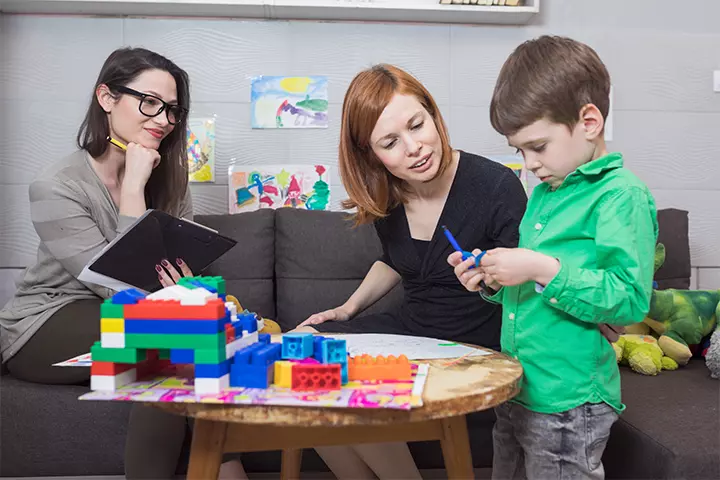
- Join parent training programs: These programs are intended to improve and strengthen the parent–child relationship while also attempting to enhance the parent’s skills to manage a child’s negative behavior. The programs are directed by psychologists and social workers and are evidence-based, through rigorous studies, and proved to be effective for many families (7).
- Use medications: Medications are sometimes combined with behavioral therapy, particularly if a child has an underlying disorder. In children with developmental disabilities, certain drugs, including anticonvulsantsiDrugs that help prevent seizures by normalizing the way nerve impulses work. , antidepressants, or beta-blocking agentsiPrescription-only medicines that work on decreasing cardiac activity to help manage several cardiovascular issues. , could control their aggressive behaviors (5).
- Teach emotional literacy: Encourage children to identify and express their emotions using simple phrases like “I feel upset” or “I feel angry.” This allows them to communicate their feelings instead of acting out.
- Redirect aggressive energy: Encourage physical activities such as sports or play to allow children to release pent-up energy in a positive way. These activities can help them express their emotions constructively and reduce aggressive behaviors.
Frequently Asked Questions
1. Is aggression learned or inherited?
Scientific studies suggest that aggression in kids may be learned or inherited. It was found that genetic and environmental factors contribute almost equally to human aggression. However, the effect of environmental factors on persons with a genetic predisposition may vary (9).
2. Why does my child keep hitting his head with his hands?
A child hitting his head may be seen in developing children when they are tired or frustrated or as a part of a temper tantrum. This may mainly occur due to a child’s inability to express strong emotions, such as anger, through the appropriate use of language (10).
3. Is hitting a symptom of ADHD?
Yes, it is. Attention deficit hyperactivity disorder (ADHD)i A neurodevelopmental disorder affecting the child's ability to pay attention, control impulses, and manage energy levels. is a neurodevelopmental disorder characterized by impulsive aggressive behavior. Hitting is a form of aggression, which could also indicate ADHD in children (13).
4. What are some long-term effects of hitting behavior in children?
If hitting behavior isn’t addressed, children might have difficulty getting along with others and develop aggressive behaviors as they get older. It’s important to address hitting early on to help them develop healthy emotional and social skills.
Parents and caregivers need to know how to stop a kid from hitting. Young children may show physical aggression to communicate their emotions. They may not know that hitting someone is bad behavior. Aggressive behaviors are common in young children exposed to bullying, abuse, trauma, or violence. It can also be seen in children with neurodevelopmental disorders. However, parents can stop a child from hitting by encouraging good behavior through positive reinforcement and rewards and enforcing rules. Nevertheless, do not hesitate to seek professional help from psychologists if required.
Infographic: Things To Do When A Child Has Cooled Down After A Tantrum
Now that your child has calmed down after a mini explosion, you can heave a sigh of relief that the worst is over. In addition, you can use this time to teach them some valuable lessons. Go through the infographic below to learn the best ways to handle your child after a tantrum.
Some thing wrong with infographic shortcode. please verify shortcode syntax
Are you worried that your child is pinching, hitting, biting, scratching, and throwing things to express themselves? Help your child learn better ways to express their emotions with this video.
Personal Experience: Sources
MomJunction articles include first-hand experiences to provide you with better insights through real-life narratives. Here are the sources of personal accounts referenced in this article.
i. Oh No, My Toddler Is Hitting People;
https://medium.com/the-mom-experience/oh-no-my-toddler-is-hitting-people-4456ac0d5d4f
ii. How I deal with hitting (and kicking, biting, taking, scratching . . .);
https://teachertomsblog.blogspot.com/2009/07/how-i-deal-with-hitting-and-kicking.html
References
- My Child Hits. Why?
https://pathways.org/my-child-hits-why/ - Toddlers and Challenging Behavior: Why They Do It and How to Respond.
https://www.zerotothree.org/resource/toddlers-and-challenging-behavior-why-they-do-it-and-how-to-respond - Fighting and Biting.
https://www.aacap.org/AACAP/Families_and_Youth/Facts_for_Families/FFF-Guide/Fighting-And-Biting-081.aspx - Violent Behavior in Children and Adolescents.
https://www.aacap.org/AACAP/Families_and_Youth/Facts_for_Families/FFF-Guide/Understanding-Violent-Behavior-In-Children-and-Adolescents-055.aspx - Gosalakkal JA; Aggression rage and dyscontrol in neurological diseases of children; (2003).
https://www.bioline.org.br/request?pn03003 - How to discipline your child the smart and healthy way.
https://www.unicef.org/parenting/child-care/how-discipline-your-child-smart-and-healthy-way - Complete Guide to Managing Behavior Problems.
https://childmind.org/guide/parents-guide-to-problem-behavior/ - 10 Tips to Prevent Aggressive Toddler Behavior.
https://www.healthychildren.org/English/ages-stages/toddler/Pages/Aggressive-Behavior.aspx - Catherine Tuvblad and Laura A. Baker; Human Aggression Across the Lifespan: Genetic Propensities and Environmental Moderators; (2011).
https://www.ncbi.nlm.nih.gov/pmc/articles/PMC3696520/# - Jane Summers et al.; Self-Injury in Autism Spectrum Disorder and Intellectual Disability: Exploring the Role of Reactivity to Pain and Sensory Input.
https://www.ncbi.nlm.nih.gov/pmc/articles/PMC5704147/ - Sisterhen LL and Wy PAW; Temper Tantrums
https://www.ncbi.nlm.nih.gov/books/NBK544286/ - Physical discipline is harmful and ineffective.
https://www.apa.org/monitor/2019/05/physical-discipline - Brittany L. Manning et al.; Relations between toddler expressive language and temper tantrums in a community sample
https://learnlab.northwestern.edu/wp-content/uploads/2019/11/Manning_2019_TemperTantrums.pdf - About Child Trauma – Effects.
https://www.nctsn.org/what-is-child-trauma/trauma-types/physical-abuse/effects
Community Experiences
Join the conversation and become a part of our nurturing community! Share your stories, experiences, and insights to connect with fellow parents.
Read full bio of Dr. Neha Bhave Salankar
Read full bio of Reshmi Das
Read full bio of Dr. Ritika Shah
Read full bio of Apoorva K





